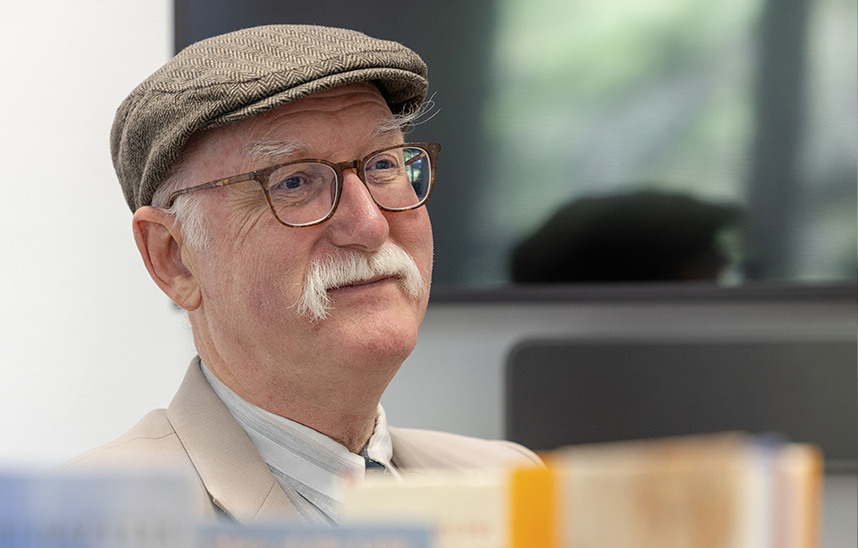"I hope my students have stayed with the principles of my teaching: clarity and conveying the truth."
Andrew Breeze, professor at School of Philosophy and Letters, retired on Sept. 1 after 37 years at the University.

Andrew Breeze holds a PhD in Medieval Philology from the University of Cambridge (1992) and researcher from the School of Philosophy and Letters since 1987. When asked where he is from, he answers with the name of the town he went to high school: Sandwich, located in the county of Kent. He says that, this way, people remember better.
He then continued his programs of study at the universities of Cambridge and Oxford, at the Catholic University of St. John Paul II in Lublin and at the Institute of Advanced programs of study in Dublin, where he devoted himself to the research of Celtic languages, until 1987, when he arrived in Pamplona. Breeze sample as a man grateful to the University, where he has developed his research vocation and has learned a lot from his students, who came from all over the world.
P. You are a doctor of Philology Medieval, you have programs of study specialized in Celtic, Irish and Welsh, among others, why did you decide to come to Spain?
I always say it is thanks to Miss Thatcher and her government's Education cuts. In the 1980s, I had finished my doctorate at Cambridge University and was considering what to do, whether to change my professional degree program or leave Britain. Then a friend informed me that a lecturer was needed at the Catholic University of Poland, where St. John Paul II was Professor of Ethics from 1954 to 1961. Although those were very happy years, Poland was still a communist country, so we wanted to leave. A friend told me about the University of Navarra. I was newly married and came with my wife, Ruth Breeze. We had never been to Spain and knew nothing about this country. 37 years later, we are still here, very happy, in Pamplona and at our University.
Q. What have you enjoyed most about your degree program research?
The research has a very special place in my heart. With the research, by discovering and publishing, you make an impact on the world. For example, the legend of King Arthur. In my book The Historical Arthur and The Gawain Poet: Studies on Arthurian and Other Traditions (2023), I wrote two chapters with some evidence and opinions why I believe that Arthur was a real historical character, as were Roland or El Cid Campeador. I hope you will remember me as the person who proved his existence.
The University has allowed me to write books, attend to congresses and sign articles. I have not sought recognition or money: my award has been to have been able to do research at the University. I believe that my work has had a value and this story has a happy ending.
Now, during my retirement, I will have time to continue publishing more books. I am a very happy man.
Q. Do you miss teaching?
Very much so. For 37 years I have learned many things from my students and that has been thanks to the University, which has allowed me not only to work researching and teaching, but also to soak in its international outreach. I have had students from Mexico, Brazil, Japan, Poland, among others. I remember once a Chinese student came up to me and told me about Confucius, showed me where he was buried, in a cemetery where there are 50 generations before him. History in China goes back 10,000 years and that anecdote made me realize that European history is nothing in comparison.
For my part, I hope that my students have kept the principles of my teaching: clarity and transmitting the truth, and that they have learned a lot. I have learned a lot as a teacher.
P. If you hadn't been a teacher, what would you have done?
Before going to Poland I was in a center for librarians for three months. After three weeks I didn't want to be there anymore, I didn't like it. When I left, I felt like the luckiest man alive because I thought I had escaped it. Then I came to Poland on the recommendation of a journalist friend, then to Dublin and from there to Spain. I've been around a lot, but what I'm sure of is that I would not be a librarian.




